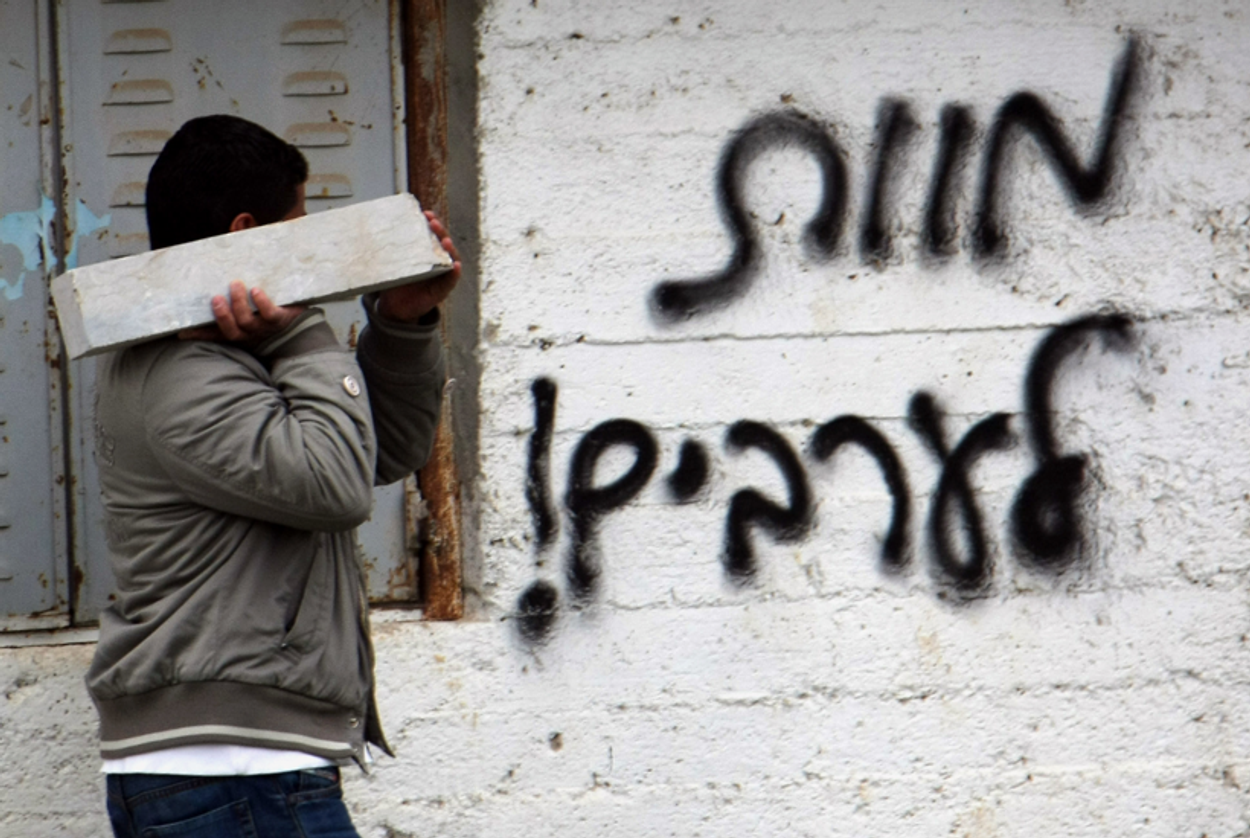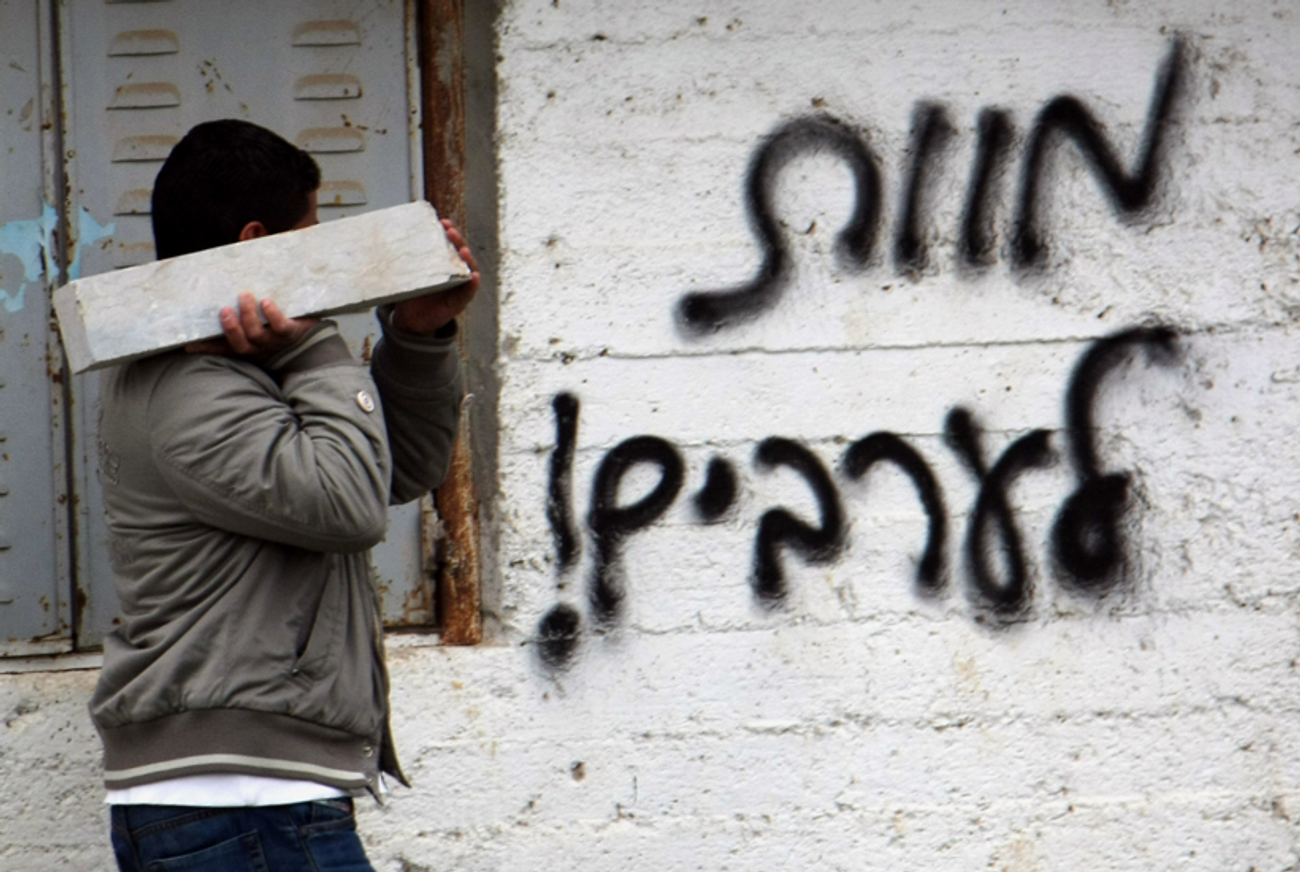Israel, Let’s Not Become Europe, Where Hate Is on the Rise
The danger for Israel isn’t becoming the Europe of 1933. It’s becoming the Europe of 2014.




Consider recent events in Israel and the West Bank. Over the last few years, settler extremists have executed hundreds of so-called “price tag” attacks, predominantly but not exclusively against Arab targets, burning down mosques, destroying property, vandalizing cemeteries, and torching homes. When three Israeli teenagers were kidnapped in June, expressions of anti-Arab racism on social media spiked, with 35,000 joining a Facebook group called “The People of Israel Demand Revenge” before it was deleted. When the teens were found dead, angry mobs marched through Jerusalem chanting “Death to Arabs,” and beating up those unlucky enough to stumble across their path. The ugly spectacle culminated in the apparent revenge killing of Arab teenager Mohammed Abu Khdeir, who was kidnapped and brutally burned alive by Jewish bigots.
In the wake of the murder, some commentators were quick to liken contemporary Israel to Nazi Germany, ominously intoning that Israel was sliding toward its own racist regime. Most of these claims were offensive and transparently malicious, but a few were genuine attempts to grapple with the gravity of what had transpired. In a Haaretz column provocatively titled “Berlin, 1933 and Jerusalem, 2014: When racist thugs are on the prowl,” Chemi Shalev drew a carefully qualified contrast between the two, writing, “When I saw the videos and pictures of gangs of right-wing Jewish racists running through the streets of Jerusalem, chanting ‘Death to the Arabs,’ hunting for random Arabs, picking them out by their appearance or by their accents, chasing them in broad daylight, ‘drooling like hysterical beasts’ and then beating them up before the police could arrive—the historical association was automatic.”
But while Shalev accurately describes the disturbing demonstrations that roiled Israeli society, he applies the wrong historical analogy to them. In fact, Israel isn’t in danger of becoming the Europe of 1933. It’s in danger of becoming the Europe of 2014.
For consider: This past January, hundreds of far-right protesters paraded through Paris chanting “Jews out of France,” singing songs mocking the Holocaust and flashing the quenelle, the inverted Nazi salute that has become popular across the European continent. This was not an isolated incident. The last month alone has seen French mobs shouting “Death to Jews,” and a string of vicious assaults—including a young woman of 17, who was pepper-sprayed in the face and other teens who were tasered and tear-gassed. During the same period, Jewish cemeteries and graves from Ukraine to the United Kingdom were desecrated, often with graffiti of swastikas and other anti-Semitic slogans.
The recent European Parliament elections saw a surge in support for far-right parties, from Greece’s avowedly anti-Semitic Golden Dawn to German neo-Nazis—one of whom, a Holocaust denier, was just appointed to the body’s civil liberties committee. Anti-Jewish sentiment has been particularly pervasive on social media, where in 2012 Jewish groups were horrified when the anti-Semitic hashtag #UnBonJuif—“a good Jew,” as in “a good Jew is a dead Jew”—began trending across France. And of course in May, Brussels—the heart of the European Union—saw three Jews and one non-Jew shot dead at the local Jewish museum, a crime that evoked the brutal 2012 murder of a rabbi and three children by French jihadist Mohamed Merah at a Jewish school in Toulouse.
The reemergence of virulent and violent anti-Semitism across Europe should trouble people of conscience everywhere. But it should trouble Jews in particular for another reason: When it comes to its treatment of its Arab citizens, today’s Israel is increasingly beginning to look like today’s Europe.
In both places, the problem is not state-sanctioned policies of racism or extermination—notions that are utterly anathema to the majority of citizens and their leaders—but rather an atmosphere of fear created by unchecked extremist elements. Most Europeans are not anti-Semitic, and most Israelis are not anti-Arab, but those who are prejudiced have become increasingly emboldened, while the governments in both societies appear paralyzed and unable to curb outbreaks of racist violence and incitement. In some cases, respectable voices have even justified the unjustifiable, as when the mayor of Malmö, Sweden, blamed Jews for their own mistreatment, explaining that they brought it upon themselves with their Zionism.
When extremists are able to act with relative impunity, beating, harassing, and even killing their targets, it fosters a profound sense of insecurity and trepidation among the persecuted population. Reading the reflections of Jewish Europeans and Israeli-Arabs, it is striking to see how similar they are. Writing in Haaretz following the recent events in Jerusalem, celebrated Arab writer Sayed Kashua fantasized about fleeing the area with his family. “This time it makes no difference what my wife says,” he wrote. “I don’t care, she can say that I’m paranoid, that I’m hysterical, but I’m not letting my kids stay in Jerusalem.” In the New York Times, Rula Salameh described her fear for her children’s safety in the aftermath of the murder of one of their peers. “When our children return to school,” she asked, “how will we let our sons and daughters walk by themselves in the mornings and evenings?”
Meanwhile, in many parts of Europe, the same sense of quiet dread pervades Jewish life. “I’m afraid that what happened in Toulouse will happen at my school, too,” French teenager Michele told the Washington Post. “I hear what people say about Jews. And I am scared.” An official survey conducted by the European Union Agency for Fundamental Rights found that nearly a quarter of European Jews are afraid to publicly identify as Jewish—and that 29 percent have considered emigrating because they felt unsafe.
Now, Israel is not yet Europe. Its price tag attacks, though unconscionable, have thus far been directed primarily at property and not people, unlike in places like France where physical assaults have been on the rise. No racists are besieging nearby mosques and trapping their worshippers inside, as is now happening at synagogues in Paris. The recent mobs of hoodlums in Jerusalem have been the exception, not the rule. Indeed, as Yaacov Lozowick, Israel’s chief archivist and a longtime Jerusalem resident has observed, “Thousands of [Arabs] have moved into the Jewish neighborhoods, and tens of thousands enter the Jewish parts daily: They work there, study there, play there, consume there, freely mingling amongst the Jews, noticed only if they choose to wear recognizably Muslim garb—which many do, unmolested.”
But the recent racial conflagrations in Jerusalem threaten to undo this hard-earned progress. Not only does this violence create an atmosphere of fear and distrust, but the resulting hostilities often undo tangible advances that have been made toward integrating Arabs and Jews—as when Arab rioters destroyed the Jerusalem light-rail station in Shuafat while protesting Mohammed Abu Khdeir’s murder, thereby cutting off an economic and social lifeline for their community.
To prevent the situation from further unraveling, Israel must do for Arabs what Europe has not done for its Jews and take aggressive steps against anti-Arab bigotry. Back in 1994, when Baruch Goldstein massacred 29 Arabs in Hebron, the Israeli government responded by arresting the leaders and other members of Kach, the racist political organization to which he belonged. They must do the same today, targeting the bigoted soccer gangs which seem to have spawned the suspects in this past month’s killing. They must also crack down on the extremist settlers whose anti-Arab crime normalizes such racism and opens the door to more vicious acts. And they must redouble efforts to integrate the Jewish and Arab populations in places like Jerusalem, because the strongest bulwark against hate is human interaction.
***
As Jews, we know all too well what it is like to live a conditional existence, forever at the sufferance of others. We have been despised outsiders, constantly reminded of our difference, and lived in fear for our children’s safety. We have often been the Sayed Kashua—the decorated artist or intellectual who suddenly finds his accomplishments and contributions to society are no protection or insurance for his family.
But this is not just tragic history. It is also a responsibility. The Bible famously enjoins the Jewish people no fewer than 36 times not to oppress the stranger, “for you were strangers in the land of Egypt.” For a Jewish state to be worthy of its name, it must embody the lessons of Jewish history and measure up to the dictates of the Jewish conscience. This is not a standard to which the world can or should hold Israel, but it is one that we Jews must always strive to uphold—especially at a time when much of the world is not granting Jews the same courtesy.
***
Like this article? Sign up for our Daily Digest to get Tablet Magazine’s new content in your inbox each morning.
Yair Rosenberg is a senior writer at Tablet. Subscribe to his newsletter, and follow him on Twitter and Facebook.
Yair Rosenberg is a senior writer at Tablet. Subscribe to his newsletter, listen to his music, and follow him on Twitter and Facebook.